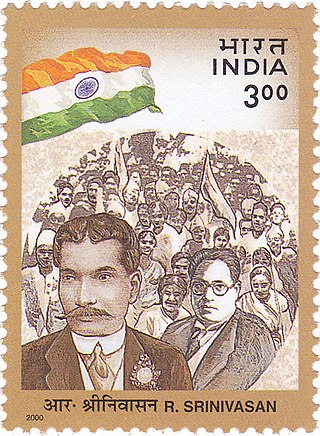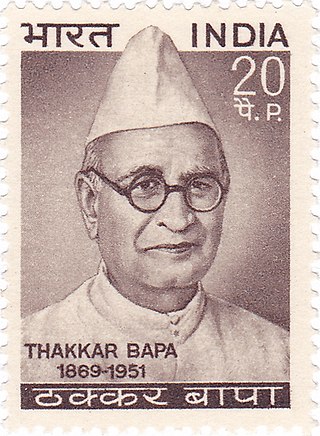
Dalit, also previously known as untouchables, is the lowest stratum of the castes in the Indian subcontinent. Dalits were excluded from the four-fold varna system of Hinduism and were seen as forming a fifth varna, also known by the name of Panchama. Dalits predominantly follow Hinduism, with significant populations of the adherents of Buddhism, Sikhism, Christianity, and Islam. Scheduled Castes is the official term for Dalits, who get reservation under Positive discrimination, as per the constitution of India.
The Temple Entry Proclamation was issued by Maharaja Chithira Thirunal Balarama Varma on November 12, 1936. The Proclamation abolished the ban on the so-called 'low caste people' or avarnas from entering Hindu temples in the Princely State of Travancore, now part of Kerala, India.

Viduthalai Chiruthaigal Katchi formerly known as the Dalit Panthers of India or the Dalit Panthers Iyyakkam is an Indian social movement and political party that seeks to combat caste based discrimination, active in the state of Tamil Nadu. The party also has a strong emphasis on Tamil nationalism. Its chairman is Thol. Thirumavalavan, a lawyer from Chennai and its general secretary is the writer Ravikumar.
The 1981 Meenakshipuram conversion was a mass religious conversion that took place in the Indian village of Meenakshipuram, in which hundreds of oppressed caste Hindus converted to Islam. This incident sparked debate over freedom of religion in India and the government decided to introduce anti-conversion legislation.

Kingsway Camp, officially Guru Teg Bahadur Nagar since 1970, is a historic area located in North West Delhi, near Civil Lines and Delhi University. It starts from Guru Teg Bahadur Nagar (GTB) intersection, and has residential areas like Hudson Lines and Outram Lines. Neighboring localities include Dhaka Village, Mukherjee Nagar and Hakikat Nagar. The foundation of the new capital of British India, New Delhi, was laid at Coronation Park by King George V in December, 1911, making this area historically significant.
G. Ramachandhran was a soldier for the Gandhian cause, social reformer and a teacher. With his wife, Dr. T. S. Soundram, daughter of T V Sundaram Iyengar, founder of TVS Group, he started the Gandhigram, Tamil Nadu in 1945. He authored several books. Viswabharati, Rabindranath Tagore's University, in Santhiniketan awarded him the higher title "Desikottama".

P. Jeevanandham also called Jeeva, was a social reformer, political leader, litterateur and one of the pioneers of the Communist and socialist movements in the state of Tamil Nadu, India.

Erode Venkatappa Ramasamy, revered by his followers as Periyar or Thanthai Periyar, was an Indian social activist and politician who started the Self-Respect Movement and Dravidar Kazhagam. He is known as the 'Father of the Dravidian movement'. He rebelled against Brahminical dominance and gender and caste inequality in Tamil Nadu. Since 2021, the Indian state of Tamil Nadu celebrates his birth anniversary as 'Social Justice Day'.

Diwan Bahadur Rettamalai Srinivasan, commonly known as R. Srinivasan, was a Scheduled Caste activist and politician from then Madras Presidency of British India. He is a Paraiyar icon and was a close associate of Mahatma Gandhi and was also an associate of B. R. Ambedkar. He is remembered today as one of the pioneers of the Scheduled caste movement in India. He founded the Adi dravida mahajana sabha in 1893.

P. Kakkan or fondly known as Kakkan, was an Indian politician and freedom fighter who served as a member of the Constituent Assembly of India, Member of Parliament, President of the Tamil Nadu Congress Committee and in various ministerial posts in Congress governments in the erstwhile Madras state between 1957 and 1967.

A. Vaidyanatha Iyer, also known as Madurai Vaidyanatha Iyer or Ayyar was an Indian activist, politician and freedom-fighter who spearheaded the temple entry movement in Madras Presidency in 1939.

Amritlal Vithaldas Thakkar, popularly known as Thakkar Bapa was an Indian social worker who worked for upliftment of tribal people in what is now Gujarat state in India. He became a member of the Servants of India Society in 1914 founded by Gopal Krishna Gokhale in 1905. In 1922, he founded the Bhil Seva Mandal. Later, he became the general secretary of the Harijan Sevak Sangh founded by Mahatma Gandhi in 1932. The Bharatiya Adimjati Sevak Sangh was founded on 24 October 1948 on his initiative. When Indian constitution was in process, Kenvi visited the most remote and difficult parts of India and conducted investigations into the situation of tribal and Harijan people. He was appointed the chairman of "Excluded and Partially Excluded Areas, a sub committee of the constituent assembly. Mahatma Gandhi would call him 'bapa'. In one of his appeals in 1939 Mahatma Gandhi called him "Father of Harijans".

Hardas Laxmanrao Nagrale, popularly known as Babu Hardas, was an Indian Dalit leader, politician and social reformer. He was an ardent follower of B. R. Ambedkar and was pioneer of the practice of exchanging the greeting Jai Bhim amongst the Dalits. He was also a prominent labour leader in the Central Province and was the general secretary of the Independent Labour Party in the province. Hardas was also the first Member of the Legislative Assembly to be elected from Nagpur Kamptee constituency in 1937.

Tamil Nadu Untouchability Eradication Front (TNUEF) is the one of the mass front of Communist Party of India (Marxist). It works to eradicate the untouchability and other forms of caste oppression. It was the key organisation which worked in razing the untouchability wall at Uthapuram.

N. M. R. Subbaraman was an Indian freedom fighter and politician from Tamil Nadu. He was a member of Parliament from the Madurai constituency (1962–1967). He was also called "Madurai Gandhi" for his Gandhian principles.
Uthapuram is a village in Madurai district, Tamil Nadu, India. It is known for a wall which segregated Dalits from the village for two decades.
The 2004 Kalapatti violence refers to the violence against Dalits by dominant-caste villagers in the village of Kalapatti, Tamil Nadu on 16 May 2004. About 100 Dalit houses have been burned down by a mob of 200 villagers and Dalits who attempted to escape were attacked. The attacks lasted for 2 hours and 14 people were seriously injured in the violence including a man's arm reportedly hacked off.
Muldas Vaishya was an Indian politician, activist and social reformer.
The 1978 Villupuram atrocity was an incident of caste based violence which happened on July 1978 in Villupuram, Tamil Nadu. The violence resulted in 12 Dalits being killed and more than 100 Dalit houses burned down in Periyaparaichery, a Dalit settlement. The violence was caused when a group of Dalits allegedly attacked a dominant caste man after he allegedly molested a Dalit women. Later, dominant caste people attacked the settlement with rocket fireworks and indulged in arsoning and assault. The Dalits also retaliated by setting fire to several dominant caste houses.
Harijan was a weekly magazine founded by Mahatma Gandhi that was published from 1933 to 1955 except for a hiatus during the Quit India movement of the 1940s. The newspaper aimed to support the campaign by its publisher, Harijan Sevak Sangh for the abolition of untouchability in India. Issues of Harijan were usually released on Saturday, initially priced at one anna, and consisted of eight foolscap pages. Companion publications in Hindi and Gujarati (Harijanbandhu) were also established.
















